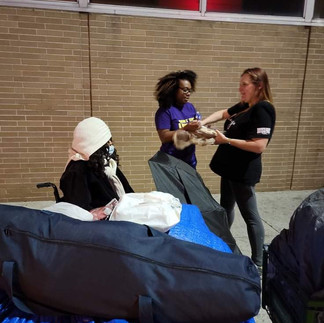How Does Being Homeless Affect Your Mental Health?
- Marla Bautista

- Jan 12, 2022
- 5 min read
Updated: Apr 7, 2022
Have you ever wondered about the relationship between homelessness and mental illness?
Is it that homelessness exacerbates an existing mental illness or does being homeless make you mentally ill?
Often the people we notice on the streets and refer to as homeless, stand out for various reasons.

One woman we work with speaks a mix of different languages that come out in incoherent streams. If you ask others on the street who she is they’ll tell you she’s extremely intelligent, once worked at a college, but none of them have any idea what she’s now saying.
Another man stands on a corner downtown, staring blankly ahead. He gets skinnier by the day. Sometimes he’s holding on to his pants keeping them in place, other times he has forgotten and they’ve fallen around his ankles. He stands there. We don’t know what he is looking for, waiting on, or seeing. Occasionally he’ll give one or two-word answers and even repeat our names. He’s a target for abuse, vulnerable, and alone.
Because these are the individuals who catch our eyes we don’t always notice the mother sitting on the park bench with her kids. Our brain tells us she’s waiting for the bus.
We don’t see the 20-year-old walking down the street looking for work. He’s clean, able-bodied, and fits into the crowd around him.
Is there a relationship between homelessness and mental illness?
Not all homeless are mentally ill. However, there does seem to be a loop between mental illness and homelessness.
A recent study published in the Colorado Coalition For the Homeless found that homelessness can lead to several mental health disorders.
While these disorders aren’t necessarily unique to people who are homeless, some of them can be exacerbated by the conditions experienced by those without safe and secure housing.
The study also found that these disorders can often persist even after an individual has gotten back on their feet and secured housing again.
Keep reading because we’ve pulled together a few of the findings and followed them up with actionable steps you can take to help individuals experiencing homelessness.
With the right resources and a strong community, we can help reduce the prevalence of mental health disorders in this vulnerable population.
Living on the street can be stressful
Imagine not knowing where your next meal will come from, or even if you’ll survive the freezing temperatures tonight? These are only two factors that may affect an individual experiencing homelessness.
What would your life look like if the next 24 hours were filled with uncertainty, fear, and the lack of basic living essentials?
In March of 2020, COVID-19 had all of us staring into an uncertain future. Imagine that same feeling but on the street, without shelter and year after year.
As a nation, we’ve started paying attention more to mental health stigmas, how it affects our youth and the inaccessibility to mental health care for vulnerable communities.
There is a shortage of mental health workers as we exit the pandemic. We are all feeling the strain, and yet those who are experiencing homelessness have fewer avenues than those of us who entered this new era with stability, a mortgage, and community support.
A 2015 study of people experiencing homelessness in Denver found that even one night on the street can have a devastating impact on an individual’s mental health and well-being.
Researchers surveyed 298 adults living on Denver streets, finding that 68 percent reported experiencing some form of severe mental illness—the most common diagnoses were post-traumatic stress disorder, depression, and schizophrenia.
The number rose to 89 percent among those who had been homeless for over three years.
Having slept on the street at least once in their lives, over 70 percent of participants experienced some kind of physical or sexual assault while homeless—another risk factor for developing a serious psychiatric disorder.
“Individuals with mental illnesses often find themselves homeless primarily as the result of poverty and a lack of low-income housing. The combination of mental illness and homelessness also can lead to other factors such as increased levels of alcohol and drug abuse and violent victimization that reinforce the connection between health and homelessness.” - Brain & Behaviour Research Foundation
Unfortunately, the lack of both mental health care and sustainable housing for vulnerable communities becomes a continuous feed-back loop.
Homelessness and Mental Health Disorders
There is a common misconception that only drug addicts or alcoholics become homeless.
Unfortunately, a growing number of families are becoming homeless due to job loss, unaffordable rent, and other causes that lead to permanent or temporary housing situations.
It’s important to note that substance abuse doesn’t necessarily cause homelessness. In fact, many people who become homeless have no history of addiction but are suffering from untreated or undiagnosed psychiatric disorders.
The short-term effects of living on the streets include depression, post-traumatic stress disorder (PTSD), anxiety disorder, panic attacks, paranoia, hallucinations (common among schizophrenic homeless), and even suicide attempts.
The longer a person is homeless, studies show an increase in severe clinical symptoms such as depression, PTSD, and psychosis.
Ways to help those who are homeless
It’s common for individuals to experience a wide range of emotions when forced to live in situations like homelessness. Without proper care or resources, anyone can find themselves facing homelessness.
Fortunately, there are many organizations dedicated to these individuals.
Here are some ways you can help those experiencing homelessness in Tampa, FL:
Donate – Donations provide people living without a home with immediate assistance such as food, water, and hygiene products. Many organizations allow donations by mail or online. We do :-) We take monthly commitments, one-time donations, and have an Amazon Wishlist that we update regularly to meet the individual needs of those we work with.
Click for the details→ Take Action - Donate Today
Volunteer – Whether it is through working directly with homeless individuals or simply donating your time and skills, volunteering offers another way to make an impact on people experiencing homelessness.
Virtual volunteer opportunities are also available. Contact us for details.
Raise Awareness – One of the best ways to raise awareness about homelessness is to spread awareness about homelessness and the causes that create it. This means informing family members, friends, and coworkers about what makes someone homeless and how they could easily contribute towards providing support.
One easy way to do this → follow us across social media
join the conversation and reshare our content
Get Involved – If you don’t feel comfortable contributing financially to organizations, get involved in whatever way you feel comfortable. You could start your own fundraiser at work or school that focuses on collecting essentials for homeless individuals rather than money. As long as you do something, anything at all, you will be making a difference—so never think small!
The Bautista Project currently has 7 programs that work together and target various in order to bring an end to chronic homelessness.
Whether you are passionate about
preventing homelessness
eliminating food insecurity
providing hygiene
individualized skill training
veteran support
creating affordable housing
building community
There is a place for you at The Bautista Project. We would love to discuss those opportunities with you directly.
REMEMBER, nothing feels better than looking back and knowing you contributed to making things better for others—no matter how big or small your contribution was!
















Reading about how homelessness impacts mental health really made me reflect on the importance of stability, safety, and supportive environments. Living without a secure home can lead to constant stress, anxiety, and isolation, which only worsens mental health struggles. That’s one of the reasons why I value services that provide not just housing, but also dignity and compassionate care for older adults. I’ve been looking at seniorcarehomes, and it shows how vital it is to create safe spaces where people can age with respect and proper support. It reminds me how access to care can truly change someone’s quality of life.
Homelessness has such a profound impact on mental health, and it’s something that often goes overlooked. The emotional and psychological toll of constantly worrying about survival, dealing with societal rejection, and the lack of stability can cause long-lasting effects. It reminds me of the importance of supportive communities, which is why website is such a valuable resource. It highlights the need for platforms that offer practical solutions, such as access to safe spaces and services for those who need them most. A community-oriented approach is essential to breaking this cycle and improving mental well-being.
They’re just a fun guessing game where your name gets mixed up with a random stranger, and boom—your dream apartment is gone because some system couldn’t tell you apart from a criminal. Classic. It’s not even the worst part, either. The real fun begins when you try to get these mistakes fixed. Calling customer service and getting an answer that sounds like it came from a robot on its fifth cup of coffee? Don’t just sit there and hope for the best. Fix the mess and get things sorted. Luckily, there’s help for this absurdity: https://consumerattorneys.com/practice-area/tenant-screening-background-check-errors. They actually know how to untangle the background check disaster. Trust me, it’ll save you a lot of time and frustration—unless you enjoy getting…
Mental health and housing are deeply connected, and I’ve seen firsthand how instability can drain a person emotionally and physically. When I was going through my own rough patch, getting help from Global Clinic made a real difference. They didn’t just treat symptoms—they looked at the bigger picture, which helped me feel more grounded. Access to that kind of support made it possible to rebuild routines, confidence, and a sense of control. Everyone deserves care that actually sees the whole person.
Homelessness takes a severe toll on mental health, increasing stress, anxiety, and depression. The lack of stability and access to medical care only worsens these challenges. For those facing serious illnesses, understanding the kidney failure hospice timeline can provide clarity on available care options, ensuring comfort and support in difficult times. Addressing homelessness requires both immediate aid and long-term solutions to improve well-being and access to essential healthcare services, which are crucial for those in vulnerable situations.